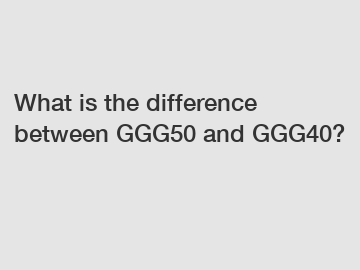What is the difference between GGG50 and GGG40?
When it comes to selecting the right material for casting components, it is essential to consider the specific characteristics and properties of each type of material. Two common materials used in casting are GGG50 and GGG40. While they may sound similar, there are key differences between the two that can impact their suitability for different applications. In this article, we will explore the distinctions between GGG50 and GGG40 to help you make informed decisions when choosing the right material for your casting needs.
### Composition and Properties.
GGG50 and GGG40 are both nodular cast irons, also known as ductile iron. Ductile iron is a type of cast iron that has been treated with trace amounts of magnesium to alter its microstructure, giving it greater flexibility and strength compared to traditional cast iron. The numbers in GGG50 and GGG40 refer to the minimum tensile strength in megapascals (MPa) that each material must meet.

#### GGG50.
GGG50 has a minimum tensile strength of 500 MPa and is considered to be a high-strength ductile iron. This material is known for its excellent mechanical properties, including high tensile strength, good ductility, and impact resistance. GGG50 is commonly used in applications that require components to withstand heavy loads or high stress levels, such as in automotive and construction machinery parts.
#### GGG40.
On the other hand, GGG40 has a minimum tensile strength of 400 MPa, making it a lower-strength ductile iron compared to GGG50. While GGG40 still offers good mechanical properties and is suitable for many general-purpose applications, it may not be as well-suited for high-stress or heavy-duty applications as GGG50. GGG40 is often used in components that require good machinability, damping properties, or corrosion resistance.
### Differences in Applications.
The choice between GGG50 and GGG40 often comes down to the specific requirements of the application. GGG50 is preferred for components that require high strength and toughness, such as gears, crankshafts, or wheel hubs in heavy machinery. Its superior mechanical properties make it suitable for applications where durability and reliability are critical. On the other hand, GGG40 is commonly used for components that do not require as high of a tensile strength but may benefit from other properties, such as good machinability or corrosion resistance.
### Machinability and Cost.
In terms of machinability, GGG40 is generally easier to machine than GGG50 due to its lower tensile strength. This can be a significant factor to consider in applications where complex shapes or tight tolerances are required. Additionally, GGG40 may be more cost-effective than GGG50, making it a more economical choice for applications where high strength is not a primary requirement.
### Conclusion.
In conclusion, the main difference between GGG50 and GGG40 lies in their minimum tensile strength and corresponding mechanical properties. While GGG50 offers higher strength and toughness, GGG40 provides good machinability and cost-effectiveness. Understanding these differences can help you select the right material for your casting needs based on the specific requirements of your application.
If you have any further questions or need assistance in choosing the right material for your casting project, feel free to contact us. We are here to help you make informed decisions and ensure the success of your casting components.
If you want to learn more, please visit our website China ball valve with pneumatic actuator manufacturer, China 2pc body ball valve manufacturer, storm valves on ships.

Comments